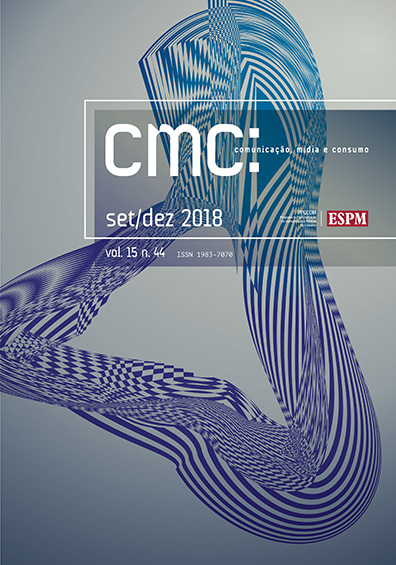Avenge and punish: motivations for spoiling
DOI:
https://doi.org/10.18568/cmc.v15i44.1632Keywords:
spoiling, series, fans, toxic practices.Abstract
Through a survey with Brazilian fans of American television series (n = 1,805), we seek to shed some light on the practice of spoiling. Having in mind that fans’ spoiling practices are made up of discourses rooted in cultural capital or subcultural capital, and in the dynamics of power inside communities, we seek to understand the spectrum of toxicity behind the practice of spoiling. The results indicate that spoiling has become a source of sociability, knowledge exchange, as well as, pleasure. However, the practice is also used for vengeance and to “punish” tardy viewers. It was observed that fans take advantage of showing more knowledge among each other, culminating in conflict in the fandoms and revealing the toxic potential behind the circulation of spoilers.
Downloads
References
BAYM, N. Tune in, log on: soaps, fandom, and online community. London: Sage, 2000.
BAKHTIN, M. M. Rabelais and his world. Indiana University Press, 1984.
BARDIN, L. Análise de Conteúdo, São Paulo, Edições 70, 2011.
BOURDIEU, P. La distinction: critique sociale dujugement. Paris: Minuit, 1979 __________, P. What makes a social class? On the theoretical and practical existence of groups. Berkeley Journal of Sociology, n. 32, p. 1-49, 1987.
__________, P. Social space and symbolic power. Sociological theory, 7(1), 14-25, 1989.
BROWN, M. E. Soap opera and women's talk: The pleasure of resistance. London: Sage Publications, 1994.
CASTELLANO, M; MEIMARIDIS, M; DOS SANTOS, M. A. Game of Spoilers: Disputas no consumo da ficção seriada televisiva. Comunicação Midiática, v.12 n.3, p.113-128, 2017.
Chau, P. Y., et al. (2002). Cultural differences in the online behavior of consumers. Communications of the ACM, 45(10), 138-143.
FRAGOSO, S. “HUEHUEHUE eu sou BR”: spam, trollagem e griefing nos jogos on-line. Revista FAMECOS: mídia, cultura e tecnologia, v. 22, n. 3, 2015.
GRAY, J. Show sold separately: Promos, spoilers, and other media paratexts. NYU Press, 2010.
GRAY, J; MITTELL, J. ‘Speculation on Spoilers: Lost Fandom, Narrative Consumption and Rethinking Textuality’. Participations Journal of audience and reception studies, vol 4, no 1, 1-35, 2007.
HASSOUN, D. Sequential outliers: The role of spoilers in comic book reading. In: Journal of Graphic Novels and Comics, 4(2), 346-358, 2013.
HILLS, M. ‘Psychoanalysis and digital fandom: Theorizing spoilers and fans’
self-narratives’ in Produsing theory in a digital world: The intersection of
audiences and production in contemporary theory edited by Rebecca A. Lind,
-122, New York: Peter Lang Inc, 2012.
JENKINS, H. ’Do You Enjoy Making the Rest of Us Feel Stupid?’: alt. tv. twinpeaks, the Trickster Author, and Viewer Mastery. Full of secrets: Critical approaches to Twin Peaks, p. 51-69, 1995. NYU Press, 2006.
________, H. Cultura da convergência: a colisão entre os velhos e novos meios de comunicação. São Paulo: Aleph, 2009.
JOHNSON, B. K; ROSENBAUM, J. E. Spoiler alert: Consequences of narrative spoilers for dimensions of enjoyment, appreciation, and transportation. Communication Research, v. 42, n. 8, p. 1068-1088, 2014.
LOPES, MIV; GÓMEZ, G. O. (Re)Invenção de gêneros e formatos da ficção televisiva: anuário Obitel 2016. Porto Alegre: Sulina, 2016.
NEWMAN, M. Z. Free TV: file-sharing and the value of television. Television & New Media, v. 13, n. 6, p. 463-479, 2012.
PASE, A. F; SACCOMORI, C. Significações da prática e do consumo de spoilers de seriados americanos: estragando (ou não) a surpresa da narrativa. In: Simone Pereira de Sá, Rodrigo Carreiro, Rogério Ferraraz. (Org.). Cultura Pop. 1ed.Salvador: Edufba, 2015, v. 1, p. 187-209.
PERKS, L. G; MCELRATH-HART, N. Spoiler definitions and behaviors in the post-network era. Convergence: The International Journal of Research into New Media Technologies, p. 1-15, 2016a.
SULER, J. The online disinhibition effect. Cyberpsychology & behavior, 7(3), 321-326, 2004.
THORNTON, S. Club Cultures: Music, Media and Subcultural Capital. Oxford: Polity, 1995.
WILLIAMS, R. " It’s About Power": Spoilers and Fan Hierarchy in On-Line Buffy Fandom. Slayage: The Online International Journal of Buffy Studies, v. 11, p. 1-15, 2004.
Downloads
Published
How to Cite
Issue
Section
License
Authors retain the copyright and grant the journal the right to first publication, with the work simultaneously licensed under the Creative Commons Attribution License that allows the work sharing with acknowledgment of authorship and initial publication in this magazine.








